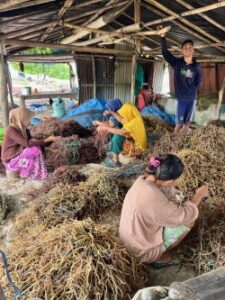Blog: Balancing conservation and livelihoods – exploring local perspectives within the Indonesian seaweed industry
By Shaun Beattie, Early Career Researcher, GlobalSeaweed SUPERSTAR
Indonesia is the world’s second-largest seaweed producer, and for more than 267,000 farming households, it’s more than just an industry – it’s a way of life. Nowhere is this more evident than in South Sulawesi, Indonesia’s largest seaweed-producing area, where vast coastal communities depend on seaweed farming for their livelihoods.
With low cultivation costs, short production cycles and minimal labour requirements, red seaweeds such as Kappapycus spp. and Eucheuma spp. have become extremely popular exports in the region. As global demand for seaweed-derived ingredients, such as carrageenan and agar continue to grow, Indonesian seaweed exports are set to rise. However, sustainable and lasting seaweed cultivation depends on healthy marine ecosystems and biodiversity-rich habitats, including those created by seaweeds themselves. Balancing conservation efforts with the industry’s rapid expansion presents a growing challenge, as this push for greater seaweed production risks putting pressure on these vital environments.
Recently, I – along with Cicilia Kambey (University of Malaya) – have been in Makassar, South Sulawesi, as part of the GCBC funded Global SeaweedSUPERSTAR project. Our goal? To explore local perspectives on the ecological and community value of seaweeds and uncover the key barriers impacting its sustainable management.
Insights and Generous Hospitality
Our goal was ambitious: to speak with and interview 100 local stakeholders, including seaweed farmers, manufacturers, aquaculture organizations, industry professionals, government officials, academic institutions, and NGOs.

As a result, these three weeks absolutely flew by as we met a number of great people, sharing conversations and insights on the current state and future of Indonesia’s seaweed industry.
What really stood out was the overwhelming support we received. Everyone we met was eager to contribute, generously sharing their time and thoughts. We were welcomed with incredible kindness, along with a nice cup of tea or coffee, as we discussed the aims of our research. On occasion, we were even treated to some incredible seaweed-based snacks and beauty products from fantastic independent business owners!
The seaweed farming communities were also eager to share their knowledge and showcase their daily routines. As we toured their farms, we often arrived to find groups of (mostly) women carefully tying individual seaweed seedlings to long lines before transporting them out to sea for cultivation. It was fascinating to see just how fast they could tie each seedling to the line at perfect intervals.
Economic Stability vs the Call for Conservation
It quickly became clear that many farmers understood the important ecological role that seaweeds played in marine ecosystems. They frequently mentioned how seaweed supports local fish stocks and acts as a nursery for juvenile fish. However, this awareness was often followed by a candid admission: that the protection of natural seaweed stocks was largely overlooked because they held little to no economic value. With the price of seaweeds fluctuating significantly in recent years, farmers were predominantly focused on securing sustainable incomes from cultivated seaweed. As a result, the protection of cultivated seaweeds was considered important, but the conservation for natural seaweed stocks was often an afterthought.
The mood for economic assurance was echoed by many of the other stakeholders we spoke with. Local NGO groups and government officials in the Department of Fisheries strongly emphasised the need for international investment to support the expansion and sustainable management of the seaweed industry. Without incentives or clear guidance, it was feared conservation would remain a lower priority for many in the industry.
Shifting Attitudes
So how can seaweed protection be implemented whilst also ensuring the needs of local communities are met?
Despite their lack of immediate ‘economic value’, corals and seagrass conservation efforts have gained significant traction in recent years. Coastal communities have become champions of their restoration and protection, largely because they now better understand healthier ecosystems benefit their livelihoods, particularly in relation to fish farming. A similar shift in attitudes could occur for seaweeds through targeted educational awareness and capacity building programmes. Many community members we spoke to were open to conservation efforts, provided they could see tangible benefits to their own lives.
One promising approach would be preliminary financing for sustainable cultivation that nudges farmers away from overharvesting practices, whilst promoting long-term sustainability. If farmers could see the economic and environmental advantages of protecting both cultivated and natural seaweed stocks, attitudes and practices may begin to shift.
Looking Ahead
These are just a few of the early observations from our time in Makassar, but one thing was clear: the immense passion and energy people have for seaweeds in South Sulawesi. I look forward to diving deeper into the responses and perspectives gathered from our interviews.
I will be presenting the results of this research at the One Ocean Science Congress (OOSC) conference in Nice, France in June 2025. I hope to discuss how these local views and practices align or contrast with global priorities in seaweed conservation, and aim to provide actional insights for advancing the sustainable management of seaweeds, that both safeguard marine biodiversity and local livelihoods.
On a final note, this research trip has reaffirmed a crucial point: harmony between conservation and economic stability remains necessary for a sustainable and successful seaweed farming industry and with the right strategies in place, this balance can start to be achieved.










